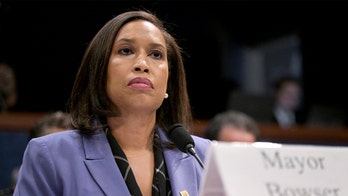Fox News Flash top headlines for June 12
Fox News Flash top headlines are here. Check out what's clicking on Foxnews.com.
Republican lawmakers in Pennsylvania are pushing their own version of sweeping election security bills that led to massive controversy in other states, but the legislation is unlikely to become law with Democratic Gov. Tom Wolf staunchly opposed.
The bill, unveiled Friday, is the result of months of hearings held by Republican legislators in the wake of a contentious 2020 election in which many Republicans criticized measures states took to hold elections during the pandemic as prone to fraud. There's been no evidence of widespread fraud in the 2020 election, but many GOP-controlled legislatures around the country have taken what they say are proactive steps to ensure elections are run more efficiently in the future.
"This responsible bill includes all aspects of issues brought before the committee and will propel Pennsylvania’s election into the 21st century, all while fixing fatal flaws and election security issues," state Rep. Seth Grove, a Republican who is the chief sponsor of the bill, said.
"This legislation is nothing short of an accurate reflection of the product of those hearings; concerns raised by local elections officials, statewide election administrators and citizens from across Pennsylvania; as well as legislative concepts supported in a bipartisan fashion by the House of Representatives in the past," Rep. Kerry Benninghoff, the Pennsylvania House majority leader, added.
PA SENATE VOTES TO END GOVERNOR'S COVID-19 EMERGENCY DECLARATION, KEEP PROTECTIONS IN PLACE
The bill would allow for voters to return mail ballots via mail, in-person to county boards of elections, or to drop boxes that are required to be monitored by election officials. It will also ban permanent mail-in voting lists, requiring voters to request a mail ballot for each election they wish to vote that way.
The bill would also establish a "Bureau of Election Audits" to "conduct result-confirming audits of each election in the Commonwealth, completed by the third Friday following the election."
Likely to be one of the most contentious changes, however, is a requirement that people present voter ID each time they vote rather than just the first time they vote at a particular polling place. This will add a requirement for voters in each election, but the law expands what counts as a valid form of identification. Voters who do not have an ID on them can also sign an affidavit.
Republicans hold majorities in both the House and Senate in Pennsylvania. But any law passed by the two chambers is very unlikely to get past Wolf, who earlier this week made clear would oppose any GOP-backed election law.
"Today, I reaffirm my commitment to the people of this commonwealth that I will always uphold our democracy. I will stand up for your freedom to vote, and I will not allow bad actors to put up barriers to voting," Wolf said Wednesday. "Not only will I stand against any efforts to roll back our freedoms, I will continue to push for changes to take down the barriers that still exist."
Wolf's administration did not immediately respond to a request for comment from Fox News asking for his reaction to the reforms. Neither did the Pennsylvania House Democrats' campaign arm. But the House Democrats' official Twitter account framed the GOP-backed bill ominously.
CLICK HERE TO GET THE FOX NEWS APP
"The Republican attack on your right to vote is here," Pennsylvania House Democrats said in reaction to the Friday announcement of the bill. Pennsylvania House Minority Leader Jonna McClinton slammed the GOP proposal in an interview with KDKA.
"We do not need a Bureau of Election Audits. One of the things I’m waiting for my colleagues across the aisle to do is end the big lie, which reeked so much terror and havoc and a deadly attack on our United States Capitol," McClinton told KDKA.
The GOP bill, which is nearly 150 pages long, also has a long list of other provisions, including a voter's bill of rights.
Among those rights are to have votes accurately counted; the right to voting assistance; the right to replacement ballots if the voter makes a mistake; the right to case a vote if the voter is in line by the time polls close; and more.














































